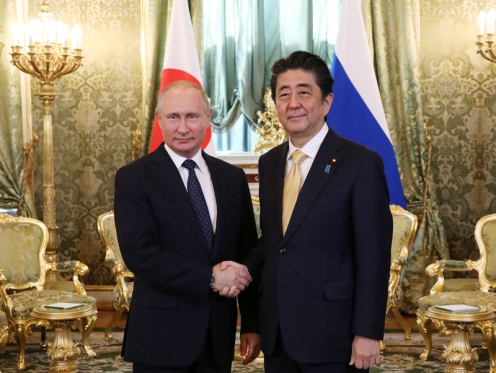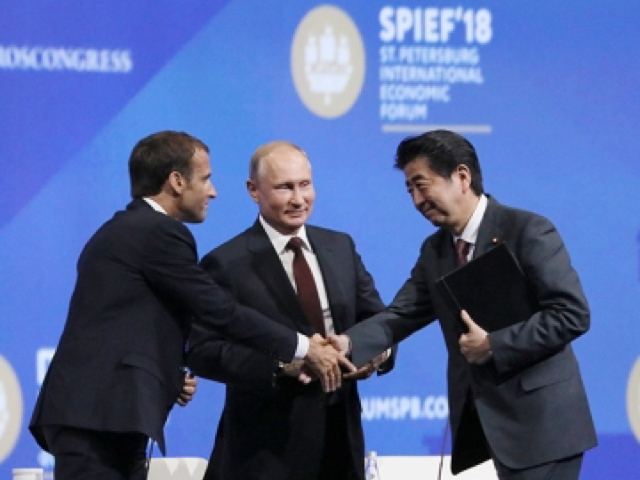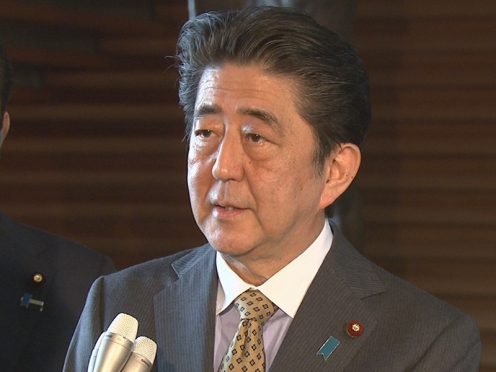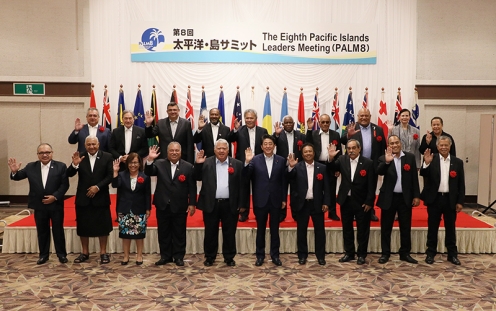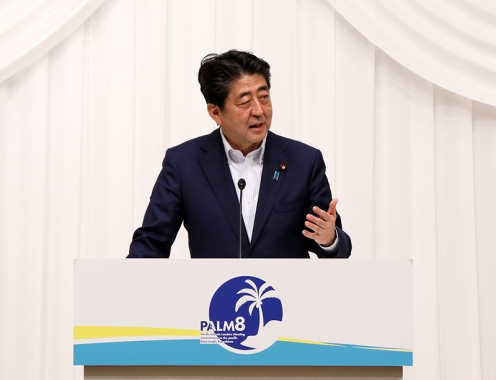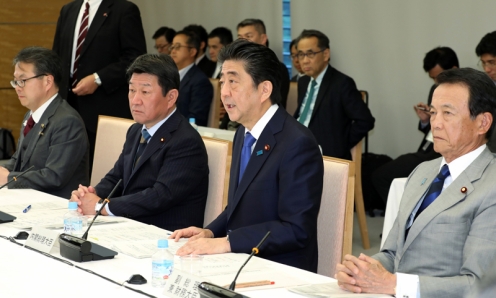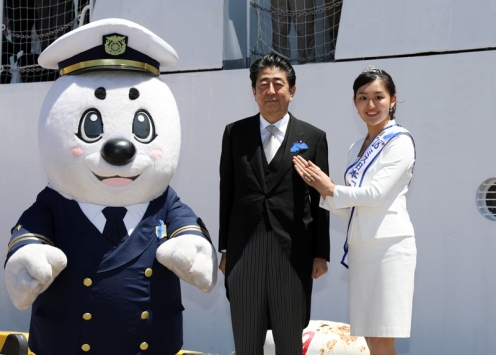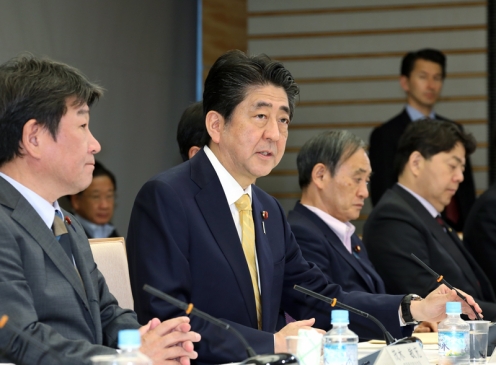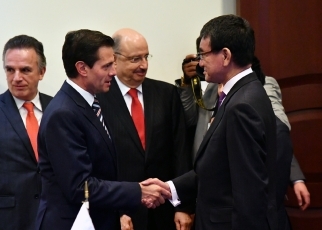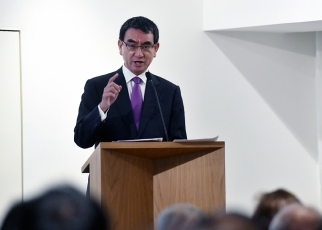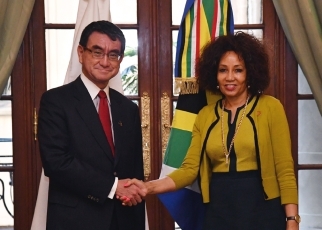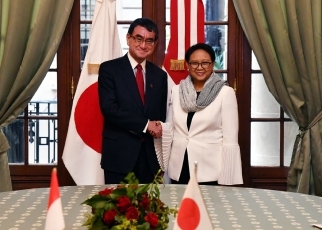Visit to Russia: Third Day
Cabinet Secretariat, May 26, 2018
[Provisional Translation]
On May 26, 2018 (local time), Prime Minister Shinzo Abe visited Moscow, the Russian Federation.
Prime Minister Abe attended a ceremony held by Akita Inu Hozonkai (Akita-Inu Preservation Society) to present an Akita Inu to Ms. Alina Zagitova, a gold medalist at the PyeongChang Olympic Games. Afterwards, the Prime Minister visited the Tomb of the Unknown Soldier, where he offered a wreath.
Later, Prime Minister Abe held talks with H.E. Mr. Vladimir Vladimirovich Putin, President of the Russian Federation. Following that, the leaders held an exchange of documents ceremony and a joint press conference.
In the evening, Prime Minister Abe attended the opening ceremony and reception for the “Japan Year in Russia” and the “Russia Year in Japan.”
Visit to Russia: First and Second Day
Cabinet Secretariat, May 25, 2018
[Provisional Translation]
On May 24, 2018 (local time), Prime Minister Shinzo Abe arrived in St. Petersburg, the Russian Federation.
On the next day, May 25 (local time), Prime Minister Abe held talks with H.E. Mr. Emmanuel Macron, President of the French Republic.
Afterwards, the Prime Minister visited the Japan Pavilion and the Russian Direct Investment Fund (RDIF) Pavilion, and then attended the St. Petersburg International Economic Forum and the Japan-Russia Business Dialogue.
Press Conference on the Visit to Russia
Cabinet Secretariat, Thursday, May 24, 2018
[Provisional Translation]
On May 24, 2018, Prime Minister Shinzo Abe held a press conference regarding the visit to the Russian Federation at the Prime Minister’s Office.
In regard to his visit to the Russian Federation and other matters, the Prime Minister said,
“This is the first summit meeting since the re-election of President Putin and the inauguration for his new term. I must speak with President Putin frankly and candidly in order to make progress on the peace treaty. I hope to make concrete progress on the joint economic activities on the Four Northern Islands and humanitarian measures for the former island residents, including grave visits.
Furthermore, in regard to North Korean issues, we have cooperated with President Putin, including on the adoption of the UN sanctions resolutions. I would like to confirm our continued and close cooperation moving forward towards a comprehensive resolution of outstanding issues of concern, including the nuclear and missile issues as well as the abduction issue.
With respect to the Diet session, I would like to exert my utmost efforts to ensure the passage of crucial legislations for the remaining period of the session. I will also make every effort to regain the trust of the people with a sense of urgency.”
In response to a question regarding the Moritomo issue (on the documents and other materials submitted by the Ministry of Finance) from the press, the Prime Minister said,
“With respect to this matter, it is as I have already responded numerous times at Diet sessions and on other occasions.”
Prime Minister Abe’s Interview with Russia-1 (Russia)
Foreign Affairs, Monday, May 21, 2018
Prime Minister Abe delivered a message on the Japan-Russia relations and his efforts towards a peace treaty in an interview with Russia-1 (Russia) on May 17. The interview was broadcasted on May 19.
Pacific Islands Leaders Meeting: Second Day
Cabinet Secretariat, Saturday, May 19, 2018
[Provisional Translation]
On May 19, 2018, following on from the previous day, Prime Minister Shinzo Abe attended the 8th Pacific Islands Leaders Meeting (PALM8), which was held in Iwaki City, Fukushima Prefecture.
First, Prime Minister Abe attended the summit meeting and gave an address at the beginning of the opening session. Afterwards, the Prime Minister participated in a commemorative photograph session.
After the summit meeting, Prime Minister Abe held a joint press announcement with H.E. Mr. Tuilaepa Fatialofa Lupesoliai Sailele Malielegaoi, Prime Minister and Minister of Foreign Affairs and Trade of the Independent State of Samoa.
Afterwards, Prime Minister Abe received a courtesy call from the Rt. Hon. Winston Peters, Deputy Prime Minister and Minister of Foreign Affairs of New Zealand. He held talks, respectively, with the Hon. Charlot Salwai Tabimasmas, Prime Minister of the Republic of Vanuatu; the Hon. Enele Sosene Sopoaga, Prime Minister of Tuvalu; and the Hon. Rick Houenipwela, Prime Minister of the Solomon Islands. He received courtesy calls, respectively, from H.E. Mr. Philippe Germain, President of the Government of New Caledonia; the Hon. Pokotoa Lalotoa Sipeli, Acting Premier and Minister of Infrastructure of Niue; and the Hon. Semisi Kioa Lafu Sika, Deputy Prime Minister and Minister for Infrastructure and Tourism of the Kingdom of Tonga.
In addition, the Prime Minister visited the Pacific Island Party 2018 in the “hula town” Yumoto area of Iwaki.
Pacific Islands Leaders Meeting: First Day
Cabinet Secretariat, Friday, May 18, 2018
[Provisional Translation]
On May 18, 2018, Prime Minister Shinzo Abe attended the Eighth Pacific Islands Leaders Meeting (PALM8), which was held in Iwaki City, Fukushima Prefecture.
First, the Prime Minister participated in a memorial service in a disaster-affected area of Fukushima Prefecture, where he laid a wreath and offered a silent prayer.
Afterwards, the Prime Minister held talks, respectively, with H.E. Mr. Tommy E. Remengesau, Jr., President of the Republic of Palau; H.E. Mr. Peter Martin Christian, President of the Federated States of Micronesia; H.E. Dr. Hilda C. Heine, President of the Republic of the Marshall Islands; H.E. Mr. Taneti Maamau, President of the Republic of Kiribati; the Hon. Henry Puna, Prime Minister of the Cook Islands; the Hon. Peter O’Neill, Prime Minister of the Independent State of Papua New Guinea; and H.E. Mr. Baron Divavesi Waqa, President of the Republic of Nauru.
Following this, Prime Minister Abe and Mrs. Abe hosted a banquet, and enjoyed a performance by the Hula Girls dancers.
In his greetings at the banquet, the Prime Minister said,
“Good evening, everyone. I would like to welcome the leaders of the Pacific islands countries and their spouses, and everyone else in attendance, to Iwaki City, Fukushima Prefecture. I am truly pleased to meet everyone again here in Iwaki City after three years. The Pacific Islands Leaders Meeting (PALM) is an important summit meeting where we strengthen our family-like ties as island countries sharing the Pacific Ocean, a huge body of water, and strengthen our partnership to address various issues of the region, inviting friends from the Pacific island countries to Japan every three years. More than 20 years have passed since we held the first PALM summit and, welcoming new friends, the PALM has evolved into an even more robust partnership participated in by 19 countries and regions including Japan. I hope that everyone will join me in welcoming President Germain of New Caledonia and Minister Maamaatuaiahutapu of French Polynesia with a round of applause.
Reconstruction is advancing steadily here in Fukushima. Last time, everyone from the Pacific island countries visited and offered flowers at Usuiso Beach during PALM7, and it was opened again to the public last July for the first time since the disaster. The cheers of children have now returned to the sea. I hope that everyone could feel for themselves how reconstruction has progressed greatly compared to three years ago during the memorial ceremony at Iwakikaisei High School today.
For dinner tonight, we have prepared a Washoku menu (traditional dietary culture of the Japanese), a UNESCO Intangible Cultural Heritage, using abundant seasonal ingredients locally sourced in Fukushima, paired with locally-produced beverages. I myself eat rice from Fukushima every day. It is safe and delicious. Please enjoy tonight’s dinner to your heart’s content.
I suspect that many people may want to start eating soon. I feel the same way, but I still have two points I would like to introduce. One is related to kimonos, another aspect of traditional Japanese culture alongside Washoku. Toward the 2020 Tokyo Olympic and Paralympic Games, the Kimono Project, which creates kimonos with motifs of the 196 countries of the world, is underway. Later, we will see a show debuting kimonos using regional motifs of the countries and regions participating in the PALM8. These kimonos use silk thread made in Fukushima. I hope that you will all enjoy the beautiful kimono show later highlighting the various Pacific island countries and regions. In addition, after dinner, we will change locations and enjoy a collaborative performance by the Hula Girls and high school students from Samoa. Continuing on from last time, the Hula Girls, the symbol of Spa Resort Hawaiians, will present a performance for us. This time, the dancers are joined by Samoan high school students as guest performers, who are scheduled to perform a Polynesian dance. I hope that everyone will enjoy both dances. As high school students from authentic Samoa are joining, the Hula Girls have practiced in corresponding high spirits.
With that, I would like to propose a toast to the success of this Summit and the bountiful future of the Pacific Ocean. Cheers!”
G7 Leaders' Statement on Venezuela
Foreign Affairs, Wednesday, May 23, 2018
We, the G7 Leaders of Canada, France, Germany, Italy, Japan, the United Kingdom, the United States of America and the European Union, are united in rejecting the electoral process leading to the May 20, 2018 Presidential election in Venezuela.
By failing to meet accepted international standards and not securing the basic guarantees for an inclusive, fair and democratic process, this election and its outcome lack legitimacy and credibility. We therefore denounce the Venezuelan Presidential election, and its result, as it is not representative of the democratic will of the citizens of Venezuela. The Venezuelan government has missed the opportunity for an urgently needed political rectification.
While the regime of Nicolas Maduro solidifies its authoritarian grip, the people of Venezuela continue to suffer human rights abuses and serious deprivation, causing increasing displacement which is affecting countries throughout the region.
We stand in solidarity with the people of Venezuela and call on the Maduro regime to restore constitutional democracy in Venezuela, schedule free and fair elections that can truly reflect the democratic will of the people, immediately release all political prisoners, restore the authority of the National Assembly and provide for full, safe and unhindered access by humanitarian actors.
We remain committed to supporting a peaceful, negotiated, democratic solution to the crisis in Venezuela and to support the Venezuelan population through humanitarian assistance.
Japan-Canada Summit Telephone Talk
Foreign Affairs, Wednesday, May 23, 2018
On May 23, commencing at around 10:15 a.m. for approximately 40 minutes, Mr. Shinzo Abe, Prime Minister of Japan, held a summit telephone talk with the Right Honourable Justin Trudeau, Prime Minister of Canada. The overview of the meeting is as follows.
1. The two Prime Ministers exchanged views on the G7 Summit, which will be held next month in Charlevoix, Canada, under the chairmanship of Prime Minister Trudeau, and agreed to work together for its success.
2. Both leaders shared the recognition that, as the upcoming G7 Summit will be held at an important juncture immediately before the U.S.-North Korea summit meeting, it is important for the G7 leaders to be united and send a strong message on the issue of North Korea. The two leaders also exchanged views on recent developments related to North Korea and affirmed that they will continue to work together to resolve the abductions issue.
3. In addition, the two leaders exchanged views on global trade, including the Trans-Pacific Partnership, women’s empowerment and gender equality, and other subjects.
Meeting of the Council on Economic and Fiscal Policy
Cabinet Secretariat, Monday, May 21, 2018
[Provisional Translation]
On May 21, 2018, Prime Minister Shinzo Abe held the sixth meeting in 2018 of the Council on Economic and Fiscal Policy at the Prime Minister’s Office.
At the meeting, there were intensive discussion on monetary policy, commodity prices, and other issues, and relevant deliberations on the Integrated Economic and Fiscal Reforms such as social security, incentive reforms, visualization, horizontal roll-outs, and other issues.
Based on the discussion, the Prime Minister said,
“Today, based on the recent Monetary Policy Meeting of the Bank of Japan (BOJ), we first reviewed the state of macroeconomic management, including monetary policy..
The Government and the BOJ have already confirmed that we will firmly uphold the joint statement (on Overcoming Deflation and Achieving Sustainable Economic Growth)..
During today’s discussion, private sector members shared their evaluation that the policy management plan of the BOJ is appropriate. I hope that the BOJ will continuously make efforts to achieve the price stability target in line with the joint statement.
Second, along with the future outlook for the social security system towards 2040,we articulated regional gaps in medical care from a variety of perspectives.
By 2025, the entire baby boomer generation will be aged 75 or older; it is expected that needs of medical and nursing care will change significantly. By that time, we must ensure that any patients have the access to appropriate medical and nursing care in their communities..
To that end, the formulation of the Community Health Care Visions, which outline the future vision of the designated prefectures, is the first important step. This was completed without delay in every prefecture as of March of last year.
The next important step is to formulate plans for each medical institution to achieve the target number of beds by functions of health care by 2025. With respect to this, intensive discussions are being held in the respective areas during the two-year period of FY2017 and FY2018. Accordingly, FY2018 is an extremely important year for the steady implementation of the regional medical frameworks.
For that reason, I would like the Minister of Health, Labour and Welfare to submit an interim report on the preparation of the plans across the country by this autumn, and to support the formulation before the end of this fiscal year, including horizontal roll-outs of best practices.
Furthermore, in order to ensure the steady transition of hospital bed functions and the conversion to Integrated Facility for Medical and Long-term Care toward the realization of the Community Health Care Vision in 2025, I would like this Council to examine the impact and costs of the measures that have been promoted to date, including funding for regional medical and nursing care, revisions of medical fees and other measures. At the same time, I would like the Minister of Health, Labour and Welfare to lead the discussion and implementation of additional effective measures, while consulting with experts.”
Commemorative Review-of-Fleet Ceremony for the 70th Anniversary of the Establishment of the Coast Guard System and Comprehensive Drills
Cabinet Secretariat, Sunday, May 20, 2018
[Provisional Translation]
On May 20, 2018, Prime Minister Shinzo Abe attended the commemorative review-of-fleet ceremony for the 70th anniversary of the establishment of the Coast Guard system and comprehensive drills held in Tokyo Bay.
Prime Minister Abe attended the review-of-fleet ceremony, boarding the patrol vessel Yashima, and then observed comprehensive drills from aboard.
After that, in an address to the participating vessels and passengers aboard, the Prime Minister said,
“Today, we held a review-of-fleet ceremony and comprehensive drills for the first time in six years. Patrol vessels and aircraft carriers have gathered from all over Japan, from as far north as Kushiro and as far south as Ishigaki Island, while relevant agencies and organizations are participating along with the United States Coast Guard.
Patrol boats and aircraft were operated in crisscross patterns. People needing assistance were spotted from a helicopter and Coast Guard members to assist them were lowered down to the exact location flawlessly. A boat suspected of breaking the law that was attempting to make a getaway was boarded swiftly. Upon seeing these extremely proficient operations with my own eyes, as Prime Minister, I am filled with the sense that the members of the Japan Coast Guard are highly dependable. I would like to express my sincere respect to the members of the Japan Coast Guard, who are even at this very moment in time, facing a wide range of threats at sea, and faithfully and admirably carrying out their mission of ensuring the safety of the seas, a mission which forms the very backbone of Japan.
Japan has been weaving history as an oceanic state, receiving the abundant blessings of the oceans and at times fending off the threats from the seas. This year marks the 70th anniversary of the establishment of the Coast Guard system. The Japan Coast Guard was established, embodying the mission of recovering peaceful, bountiful seas, at a time when lighthouses were destroyed during the previous War, many ships were left in place after being sunk by naval mines, and there was rampant maritime crime, such as stowaways and smuggling, and the maritime order had been breaking down. We are eyewitnesses to the fact that the members of the Japan Coast Guard are always striving for the people’s happiness, opening the seas, and working hard for security at sea, braving rough waters at the sites of sea rescues, covered in oil at sites where tankers run aground, or evading being shot at while chasing spy ships. Without the Japan Coast Guard, we would not have this current maritime safety and Japan would not have prospered.
Every time I come in contact with members of the Japan Coast Guard, who are risking their lives to protect the waters of Japan with a constant sense of urgency in a difficult environment, I am reminded of a line from a poem by Takamori Saigo.
‘Yuki ni Taete Baika Uruwashi (Enduring the snow, the plum blossoms are elegant).’
Plum trees beautifully bloom releasing a fragrant aroma in spring because they endure the cold of harsh winters. Happiness awaits those who firmly endure and overcome trials and tribulations. This is the reason why the insignia of the Japan Coast Guard has a plum blossom on it. Like plum blossoms, all of you fulfill your mission with great endurance, no matter how difficult the situation, and I am proud of you. I hope that you will continue to fulfill your noble duty of securing the safety of the oceans and meet the expectations of the public.
The situation regarding the waters surrounding Japan has becoming increasingly severe in a way we have never seen before. There have been repeated intrusions of foreign governmental vessels into our territorial waters around the Senkaku Islands, and we continue to confirm drifting ships thought to have floated in from North Korea in the Sea of Japan. There is always a tense atmosphere in the waters around Japan.
In response to this situation, the decision was recently made to set maritime security as an important pillar of ocean policy. The Government will work in unity to face these difficulties.
Maritime security can be achieved not only through our own efforts to protect the peace and security of Japan but also through our work to create and bolster international maritime order, collaborating with other countries.
The Japan Coast Guard continues to stand on the front lines, rushing to face threats head on at sea. The gleaming white bodies of your ships show the will of Japan to resolve peacefully in accordance with the law without succumbing to force. Your efforts to take the initiative on the rule of law at sea are garnering much attention all around the world.
Crackdowns of maritime crime, patrols in territorial waters, sea rescues, the safety of maritime transport, and ocean research. These are all indispensable for the firm protection of free and open seas based on the rule of law. I would like all members of the Japan Coast Guard to strive diligently to meet the great expectations placed on you from within and outside of Japan and to work on these issues.
Japan has no future as an oceanic state without the Japan Coast Guard. I hope that you will make full use of the capabilities fostered by its 70-year history to carry out important missions more than ever before.
‘When will you be back?’
‘I do not know when.’
This conversation has been repeated numerous times between the members of the Japan Coast Guard and their families. How many times have your families seen you off as you embark on a duty to fulfill day and night, never knowing when it will end? I feel sorry that your families undergo such anxiety and hardships on each mission.
Thanks to the support they receive from their families in particular, the members of the Japan Coast Guard can exert every effort to ensure the safety and security of the Japanese public and protect the peaceful, bountiful seas. I would like to take this opportunity to express my heartfelt gratitude.
Lastly, I would like to thank everyone on board today for your understanding and cooperation with the Japan Coast Guard on a daily basis. I would like to draw my remarks to a close by sincerely requesting further support and cooperation going forward, and by expressing my hope for your continued happiness.”
Council on Investments for the Future
Cabinet Secretariat, Thursday, May 17, 2018
[Provisional Translation]
On May 17, 2018, Prime Minister Shinzo Abe held the 16th meeting of the Council on Investments for the Future at the Prime Minister’s Office.
At the meeting, there was discussion on human resources development in the age of artificial intelligence (AI), establishment of a next generation healthcare system, and the productivity revolution in the regions (transformation of forestry into a growth industry).
Based on the discussion, the Prime Minister said,
“A transformation of all aspects of our socioeconomic system is essential to create an era of Society 5.0. More than anything else, human resources development is the most important issue. In particular, literacy in information technology (IT) or information processing, such as artificial intelligence and big data, will become the equivalent of reading, writing and arithmetic. With this in mind, it is necessary to fundamentally expand statistics and information education at all levels of schooling from elementary school to university. For university entrance exams as well, informatics needs to be added as a mandatory subject much like Japanese, mathematics and English, to encourage learning of science and mathematics regardless of whether students wish to specialize in liberal arts, humanities and social sciences or math, sciences and engineering. In order to advance reform towards the transition to a new education system fitting Society 5.0, I would like to ask the Minister of Education, Culture, Sports, Science and Technology to give due consideration over detailed reform proposals and swiftly implement them, including creating new degree programs that transcend silos between departments of science and departments of technology and engineering, in addition to the aforementioned points.
Amidst the rapid approach of the year 2025, when all the baby boomers will have reached 75 years of age, technologies of the fourth industrial revolution will play an important role in improving our social security system, including the responses to the issues related to dementia. I ask the Minister of Health, Labour and Welfare to advance initiatives for further advancements from a user perspective, including the next and subsequent revisions of medical fees and other amendments required towards creating an environment where individuals can effectively utilize their medical and nursing data as well as enhancing online healthcare including medication instructions.
I also believe that our rich forestry resources, a pride of Japan, will become a major trump card for revitalization of local economies, if we increase productivity using cutting-edge technologies such as drones. To this end, it is also necessary to boldly advance the upsizing of forestry. While the Government has submitted a forestry business management bill aimed at creating highly productive forestry management entities in the current session of the Diet, I ask that the Minister of Agriculture, Forestry and Fisheries work on developing a legal system so that operations can be carried out over the long-term on large lots, in order to encourage consolidating and integrating privately owned forests, incorporating certain areas of national forests.
We will advance efforts so that Japan materializes Society 5.0 ahead of the rest of the world. Under this shared recognition, I ask that the entire Cabinet work together to continue to accelerate reforms in various fields. In this regard, I request the cooperation of each minister.”
Decision on the Dates of the 2019 G20 Foreign Ministers’ Meeting
Foreign Affairs, Tuesday, May 22, 2018
1. As of the G20 Presidency in 2019, Japan has decided to host the G20 Foreign Ministers’ Meeting on 22 and 23 November 2019 in Nagoya City, Aichi Prefecture.
2. At the meeting, the G20 Foreign Ministers will discuss the various challenges facing the international community, from the perspectives of leading in achieving the stability, sustainable and inclusive growth of global economy, as well as in addressing various global challenges.
Foreign Minister Kono pays a courtesy call on President of the United Mexican States
Foreign Affairs, Thursday, May 24, 2018
On May 24, commencing at 7:15 p.m. (local time) for approximately 40 minutes, H.E. Mr. Taro Kono, Minister for Foreign Affairs, paid a courtesy call on H.E. Mr. Enrique Peña Nieto, President of the United Mexican States, during his visit to Mexico. The overview is as follows.
Minister Kono expressed his pleasure to visit Mexico in this commemorative year of the 130th anniversary since the establishment of Japan-Mexico diplomatic relations and gratitude for the supports from Mexico after the Great East Japan Earth quake. In response, President Pe?a Nieto welcomed Minister Kono's visit to Mexico, by blessing the 130th anniversary of the establishment of diplomatic relations, and expressed gratitude for the aid from Japan when the earthquake hit Mexico last year.
President Pe?a Nieto expressed his respect for Japan's leadership in the TPP11. Minister Kono stated that Mexico serves as a gateway of Japan's relations with Latin America and the Caribbean, and expressed his intension to further strengthen cooperation in various areas including economy.
Regarding the issues related to North Korea, Minister Kono explained Japan's basic stance after United States' announcement that US-NK summit on June 12 was cancelled. President and Minister Kono agreed on keeping close collaboration.
Policy Speech by Mr. Taro Kono, Minister for Foreign Affairs of Japan, in Japan House Sao Paulo
Foreign Affairs, Sunday, May 20, 2018
It is my great honor to speak here at the Japan House in Sao Paulo today. This is my first visit to Latin America, both personally and as Foreign Minister.
From here I will go to Buenos Aires this afternoon for the G20 Foreign Ministers’ Meeting. The Foreign Minister of Argentina called me last week about this G20 meeting, and at the end of the conversation he said he was looking forward to my visit so much because my visit would be the first one in 24 years by a Foreign Minister of Japan.
And he added “it’s funny the name of the last Japanese Foreign Minister who visited Argentina was also Kono, just like yours.”
I had to say “Minister, of course it is Kono. He is my father.” One Foreign Minister’s visit in one generation! We must do better than that. I am asking Finance Minister to buy me an airplane so that I can fly around. It could be small but must be able to fly long distance.
My father also came to Brazil, but I am relieved to say my immediate predecessor Mr. Kishida also visited Brazil. So it’s not the first time in 24 years. My father came back to Brazil once again accompanying Their Majesties the Emperor and the Empress. After the trip, my father told me how enthusiastically Their Majesties were received in Brazil. We really appreciate it, and I am very happy to know that Her Imperial Highness Princess Mako is planning to visit Brazil for the celebration of the 110th anniversary of Japanese immigration to Brazil.
On Thursday last week I welcomed your Foreign Minister, His Excellency Mr. Aloysio Nunes Ferreira, into my office and we had lunch together. I guess he already has his own airplane. We affirmed our commitment to the bilateral relationship and closer cooperation between Japan and Brazil.
Ladies and gentlemen,
We celebrate the 110th anniversary of Japanese immigration to Brazil this year. Today, 1.9 million Japanese-Brazilians live in Brazil, while 180 thousand Brazilians live in Japan. During my conversations with young Japanese-Brazilians last night, I was most impressed by their active role in this country and their pride in both being Brazilian and also having roots in Japan.
We never forget that your trust towards Japan is based on the constant contributions of those Japanese immigrants and their Nikkei descendants to the local communities in this country. We are very appreciative of that.
That is why Japan opened the first-ever Japan House in the world one year ago here in Sao Paulo. We hope it serves as a bridge that connects our two countries which are located on opposite sides of this planet, separated by a 24 hour flight. I came via Dubai, and actually it took 27 hours. This Japan House welcomed over 770 thousand visitors since its opening. I just went upstairs and checked the number. It’s actually 789 thousand today. Japan House provides opportunities for everyone to be acquainted with Japan’s charming features, as well as its contribution to the world.
So now, I would like to take this opportunity to share and exchange our views on global challenges and Japan’s efforts to address them, as well as the new stage of collaboration with Latin America and the Caribbean countries.
The Latin America and the Caribbean region and Japan share fundamental values such as democracy, rule of law, human rights and market economy.
The liberal international order based on these common values led to the peace and prosperity of today’s world.
Yet this international order is now faced with some serious challenges, and the foundations of development and prosperity are being undermined today.
We believe that economic growth will enhance democracy in a country. Japan has made contributions to the world through government assistance based on this premise. The world has seen tremendous economic growth recently, but unfortunately, the number of democratic countries are not on the rise at the same rate.
We are now watching populists and extremists taking over the political scenes all over the world and, in some countries, new dictators taking over the government for their own good.
I still have faith that real market economy leads to democracy as the middle class it creates will eventually crave for political freedom.
But the state capitalism would not. State capitalism creates a new class whose success has depended on their connection with the existing government. If your success is tied to the existing system or government, why would you demand democracy or free election which might lead to a change in government?
We need to work together so that we can keep the flag of democracy high and waving.
I came to the Parliament back in 1996. And back then, Japan was still trying to build a wall around itself to protect its agriculture and other weak industries. I still remember we had a free trade negotiation with Singapore. Because Singapore is so small and has almost no agriculture, we thought it would be a good partner for our first free trade negotiation. But someone accidentally found out that Singapore has a goldfish industry. Oh no, it could be a threat to our goldfish industry. So, tiny, tiny goldfish delayed our negotiation of free trade for six months.
It has been twenty years since then, and Japan went through two decades of economic downturn and deflation. We learned lessons the hard way, and now Japan is calling on the world to protect the free trade.
Japan and the United States, together with likeminded countries, set out to create a new international order for trade and investment and other economic rules fit for the 21st century in Asia-Pacific. It was also to create a new strategic order in the region.
The Abe government and the ruling Liberal Democratic Party spent big political capital to convince farmers and some industries that we could no longer close our economy if we want to increase the productivity of the country.
It was very shocking to us when the Trump Administration decided to make a U turn, but the eleven other countries were determined to spread the gospel of free trade in the Asia-Pacific.
TPP 11 will enter into force soon. Although its name is “Trans-Pacific” partnership there is no regional requirement in the treaty. We may have to change its name from “Trans-Pacific” to “Trump-Pacific” in order to get the US back to the treaty, but the United Kingdom is already showing its interest to join the TPP11. So, I would like to welcome Brazil and the other Latin American and Caribbean countries to join the TPP.
We are now talking to the United States about how we all need to stand firm with the WTO, which has been the cornerstone of the free trade regime. It is also true that the WTO needs some mending and updating, such as e-commerce and intellectual property rights, I am sure we can work it out.
Although protectionism and inward-thinking tendencies are still seen in places, Japan will remain unwavering in its belief that a free and open international economic system assures the prosperity of the world.
It is true that the advancement of economic globalization and innovation has brought about social discontent and anxiety due to expanding inequality. But dictatorship, populism, extremism or protectionism can never be real answer to that.
The commercial relationship between Japan and Latin America and the Caribbean countries have been expanding remarkably in recent years. The number of Japanese business establishments in the region has nearly doubled in the last 5 years, which has contributed to the strong global supply chains of Japanese corporations.
Latin America is situated in a strategic location for marine transportation, including the Panama Canal and the Strait of Magellan. Both LAC countries and Japan enjoy the blessings of the ocean. We need to work together to maintain the free and open maritime order based on universally recognized principles of international law, including those reflected in the United Nations Convention on the Law of the Sea (UNCLOS).
Japan is now trying to maintain free and open maritime order based on the rule of law from the east coast of Africa to the west coast of North and South Americas through the Middle East, Indian subcontinent, ASEAN countries, the Pacific Island Countries, Australia and New Zealand.
We aim to ensure stability and prosperity of the international community by making a free and open Indo-Pacific as global commons, through for example, increasing connectivity with high quality infrastructure, and capacity building for law enforcement, counter-terrorism and disaster management. Japan is open to cooperate with any country if we can share this vision.
If Latin America and Asia have a stronger connection, there will be different opportunities and possibilities.
We expect your strong support and cooperation.
The history of cooperation between Japan and LAC countries shows a model of sustainable development.
For example, PRODECER, a joint project between Japan and Brazil started in 1979, developed “Cerrado” in the Brazil’s mid-west into the largest agricultural region in the southern hemisphere, transforming Brazil into a grain belt for soybeans. This so called “Miracle of the Cerrado”, which contributed not only to social and economic development in Brazil but also to global food security.
Well, it doesn’t stop there. Today, the spirit of sustainable development is expanding beyond this continent. Japan and Brazil together are now promoting sustainable development in other countries, such as Mozambique and Angola, providing knowledge from our shared experience. We expect that our partnership will play a more active role for the development of the rest of the world.
A stable security environment is the foundation of our prosperity. Coping effectively with actual threats is any governments’ utmost concern.
North Korea's nuclear and missile development is a common threat to peace and security of the international community. Japan welcomes North Korea’s intention towards complete denuclearization, which was confirmed at the Inter-Korean Summit last month.
But, there is still a long way to go before achieving our common goal of North Korea’s so called CVID; complete, verifiable, and irreversible dismantlement of all weapons of mass destruction (WMD), including biological and chemical weapons, ballistic missiles of all ranges, and its related facilities.
A US-South Korean joint military exercise was started on May 11, and North Korea certainly knew it. On May 15 North Korea accepted an offer from the South Korean government to hold another round of ministerial talk and proposed to hold it the next day, only to cancel the meeting early next morning citing the US-Korean joint military exercise. So North Korea is already starting playing game.
In order to urge North Korea to take concrete actions toward our goal through the upcoming US-North Korea Summit next month in Singapore, we have to maintain pressure against North Korea through the economic sanctions based on the UN Security Council Resolutions, and must not make a mistake on the timing of easing sanctions.
The United Nations Security Council makes important decisions such as the sanctions against North Korea. But this Security Council does not reflect the reality of today’s world.
If we are to address our security concerns more effectively, the Security Council needs to be reformed to reflect the realities of the 21st century. Japan is working very closely with Brazil as members of the G4, and is ready to work more closely with other LAC countries to achieve our common goal.
Next year, Japan will take over the presidency of the G20 from Argentina, and Chile will host APEC. We can assume Japan and Latin America and the Caribbean will play bigger roles and cooperate more and more in the international arena.
Japan and LAC countries are entering into a new stage of collaboration. To address global issues, we pursue the networking of like-minded nations. Again, I call for partnership with LAC countries, including the regional and sub-regional organizations, such as Mercosur, the Pacific Alliance, CARICOM and SICA.
Based on the common values we share and our long-lasting friendship of over 100 years, Prime Minister Shinzo Abe, during his visit to Latin America in 2014, announced three guiding principles for cooperation with Latin America and the Caribbean, composed of “progredir juntos”, “liderar juntos” and “inspirar juntos”.
We would like to expand our relationship on these “juntos!!”.
Finally with my promise that Japan’s Foreign Minister will visit Brazil more often and regularly, I conclude my speech with thankfulness and hope for our future relationship.
Thank you very much.
Japan-South Africa Foreign Ministers’ Meeting
Foreign Affairs, Monday, May 21, 2018
On May 21, commencing at local time around 2:55 p.m. (May 22 at around 2:55 a.m. Japan time), for approximately 20 minutes, Mr. Taro Kono, Minister for Foreign Affairs, who was visiting Buenos Aires to attend the G20 Meeting of Foreign Affairs Ministers, held a bilateral meeting with Hon. Lindiwe Nonceba Sisulu, Minister of International relations and Cooperation of the Republic of South Africa. The overview is as follows.
Minister Kono expressed his gratitude for the cooperation of the Government of South Africa towards the successful holding of the first Japan-Africa Public-Private Economic Forum this month in Johannesburg, South Africa. Furthermore, he requested an early visit of Minister Sisulu to Japan for a Japan-South Africa Partnership Forum as well as her participation in the Ministerial Meeting of the Tokyo International Conference on African Development (TICAD) to be held in Tokyo this year. In addition, as Japan will host TICAD 7, G20 and Rugby World Cup next year, he expressed expectations for further strengthening the relations between the two countries.
In response, Minister Sisulu stated that she would like to enhance the relationship with Japan, including through participation in various meetings to be held in Japan. She expressed her hope for cooperation with the Government as well as companies of Japan, especially in the areas of investment promotion, which President Cyril Ramaphosa advocates, as well as skills transfer and job promotion for the youth.
In addition, the two ministers exchanged views on cooperation in the international arena, including the reform of the United Nations Security Council.
Japan-Indonesia Foreign Ministers’ Meeting
Foreign Affairs, Monday, May 21, 2018
On May 21, commencing at 2:00 p.m. (local time) for approximately 30 minutes, Mr. Taro Kono, Minister for Foreign Affairs, held a meeting with H.E. Ms. Retno L.P. Marsudi, Minister of Foreign Affairs of the Republic of Indonesia, in Buenos Aires, the Argentine Republic, during his visit to attend the G20 Foreign Ministers' Meeting. The overview of the meeting is as follows.
At the beginning, Minister Kono mentioned the recent terrorist attacks that took place in Surabaya and elsewhere, and expressed his sincere condolences to those who lost their lives or were injured, and their grieving families. Furthermore he stated that such inhuman acts of terrorism cannot be justified for any reason and Japan firmly condemns them. In response, Minister Retno stated that terrorism is an actual threat, and Indonesia intends to cooperate with Japan in the field of counterterrorism.
Minister Kono noted that this year marks the 60th anniversary of the establishment of diplomatic relations, and he intends to further strengthen the Japan-Indonesia relationship. Minister Retno replied that she wants to use the 60th anniversary of the establishment of diplomatic relations this year as an opportunity for further expanding the Japan-Indonesia relationship.
The two ministers also exchanged views on regional affairs, including North Korea, the South China Sea and the Middle East situation, and shared the view that they will collaborate closely going forward also. In addition, Minister Kono sought Minister Retno's understanding and cooperation in promptly resolving the abductions issue.
METI Minister Seko Had Meetings with Mr. Zhong Shan, Minister of Commerce, of the People's Republic of China, and Mr. He Lifeng, Chairman of the National Development and Reform Commission
METI, Thursday, May 10, 2018
On Wednesday, May 9, Mr. Hiroshige Seko, Minister of Economy, Trade and Industry had meetings with Mr. Zhong Shan, Minister of Commerce, and Mr. He Lifeng, Chairman of the National Development and Reform Commission, who officially visited Japan to attend the Japan-China-ROK Trilateral summit.
1. Meeting with Mr. Zhong Shan, Minister of Commerce
Both sides shared the awareness that it is important to advance a broad range of cooperation and to increase economic exchanges between the two countries.
Minister Seko stated that Japan firstly respects free and open trade based on rules and it is necessary to eliminate market-distorting measures that are the root cause of exchange of trade restrictions worldwide.
Also, both sides exchanged opinions on the advancement of negotiations regarding Japan-China-Republic of Korea FTA and RCEP.
Both sides decided to establish the Japan-China Services Trade Cooperation Mechanism as a part of Japan-China cooperation in the service industry in order to develop a favorable environment for trade and investment in services and to facilitate investment and mutual cooperation in this field. At the following Japan-China summit meeting, Minister Seko and Minister Zhong Shan signed the Memorandum on the Strengthening of Cooperation in Service Trade)
Regarding business cooperation in third countries, both sides exchanged opinions for the purpose of providing opportunities for discussions among related parties in the public and private sectors with the aim of promoting business expansion of Japanese and Chinese companies in third countries. At the following Japan-China summit meeting, Minister Seko, jointly with Mr. Taro Kono, Minister for Foreign Affairs, signed the Memorandum on the Private-Sector Economic Cooperation in Third Countries between Japan and China with Chairman He Lifeng and Minister Zhong Shan.
Minister Seko pointed out the necessity to develop business environments, including IP-related legislation, and both sides reached a consensus to continue deliberations at the ministerial level.
2. Meeting with Mr. He Lifeng, Chairman of the National Development and Reform Commission
Both sides decided to establish the Japan-China Service Industry Cooperation Mechanism as a part of Japan-China cooperation in the service industry in order to promote cooperation in the areas of the service industry such as elderly care and support and education through exchanges views of macropolicies. At the following Japan-China summit meeting, Minister Seko and Chairman He Lifeng signed the Memorandum on the Development of Cooperation in the Services Industry).
Minister Seko also mentioned his intention, based on the Mechanism, to hold a symposium on Eldarly Care and Support as early as the end of 2018in Beijing and Chairman He Lifeng showed a positive stance.
Regarding business cooperation in third countries, both sides exchanged opinions for providing opportunities for discussions among related parties in the public and private sectors with the aim of promoting business expansion of Japanese and Chinese companies in third countries. At the following Japan-China summit meeting, METI Minister Seko, jointly with Mr. Taro Kono, Minister for Foreign Affairs, signed the Memorandum on the Private-Sector Economic Cooperation in Third Countries between Japan and China with Chairman He Lifeng and Minister Zhong Shan.
Additionally, both sides exchanged opinions on LNG cooperation among Japan, China and the Republic of Korea, and the holding of the Japan-China Energy Conservation and Environment Forum.
Japan to hold RCEP Ministerial Meeting in Tokyo on July 1, 2018
METI, Tuesday, May 15, 2018
On July 1, 2018, Japan will be hold the Fifth Intersessional Ministerial Meeting of the Regional Comprehensive Economic Partnership (RCEP) in Tokyo for negotiations.
The RCEP is a concept of broad regional economic partnership, which is under negotiations among ten ASEAN economies and six countries (Japan, China, ROK, Australia, New Zealand, and India). Japan aims at early conclusion of a comprehensive, well-balanced and quality RCEP. The Ministry of Economy, Trade and Industry (METI) hereby announces that Japan will host an RCEP ministerial meeting in Tokyo on July 1, 2018, based on the approval from all participating countries.
This Tokyo meeting is the ministerial meeting that Japan, a non-ASEAN economy, will host for the first time in the almost five-year history of RCEP-negotiations.
Background
Conventionally, two concepts of economic partnership coexist in the Asian region; the Comprehensive Economic Partnership in East Asia (CEPEA; ASEAN +6) proposed by Japan, and the East Asia Free Trade Agreement (EAFTA; ASEAN +3) proposed by China. They have been researched and studied in the private sector or through inter-government efforts. In November 2011, in light of these two concepts, the leaders of the ASEAN economies agreed on launching a process for establishing an RCEP with its FTA partner countries.
In November 2012, at the ceremony to launch negotiations for RCEP which was during the ASEAN-related Summit Meetings, leaders of ASEAN countries and FTA partner countries announced the launch of RCEP negotiations.
In May 2013, the first negotiation round was held in Brunei Darussalam.
Participating countries have held ten ministerial meetings, including intersessional meetings, and 22 negotiation rounds so far. At the ASEAN Summit Meeting held in November 2017, leaders reconfirmed their intention to aim at conclusion of quality agreements by setting market access, rules and cooperation as pillars and adopted a joint leaders’ statement in which they instructed negotiators to intensify efforts in 2018 to bring the RCEP negotiations to conclusion.
Statement by Governor Kuroda concerning the Bank's Semiannual Report on Currency and Monetary Control (Committee on Financial Affairs, House of Councillors)
Bank of Japan, Tuesday, May 22, 2018
Introduction
The Bank of Japan submits to the Diet its Semiannual Report on Currency and Monetary Control every June and December. I am pleased to have this opportunity today to talk about developments in Japan's economy and present an overall review of the Bank's conduct of monetary policy.
I. Economic and Financial Developments in Japan
I will first explain economic and financial developments in Japan.
Japan's economy is expanding moderately, with a virtuous cycle from income to spending operating. In the corporate sector, exports and production have been on an increasing trend, mainly on the back of firm growth in overseas economies. In this situation, corporate profits and business sentiment have maintained their improving trend, and business fixed investment also has continued on an increasing trend. In the household sector, the employment and income situation has continued to improve steadily. The labor market conditions have continued to tighten, as evidenced by the unemployment rate having declined to around 2.5 percent; wages have been rising moderately, as seen in the fact that many firms have raised their base pay for the fifth consecutive year in the annual labor-management wage negotiations this spring. Against this background, private consumption has been increasing moderately, albeit with fluctuations.
Going forward, Japan's economy is likely to continue growing at a pace above its potential in fiscal 2018, mainly against the background of highly accommodative financial conditions and the underpinnings through government spending, with overseas economies continuing to grow firmly. From fiscal 2019 through fiscal 2020, the economy is expected to continue on an expanding trend supported by external demand, although the growth pace is projected to decelerate due to a cyclical slowdown in business fixed investment and the effects of the scheduled consumption tax hike. As for risks to this baseline scenario of the outlook for economic activity, upside and downside risks are generally balanced in fiscal 2018, but risks are skewed to the downside for fiscal 2019 onward, mainly due to uncertainties over developments in overseas economies.
On the price front, the year-on-year rate of change in the consumer price index (CPI, all items less fresh food) has continued to show relatively weak developments when excluding the effects of energy prices compared to the economic expansion and the labor market tightening, mainly against the background that firms' wage- and price-setting stance has remained cautious. Nonetheless, medium- to long-term inflation expectations are projected to rise as firms' stance gradually shifts toward raising wages and prices with an improvement in the output gap continuing. As a consequence, the year-on-year rate of change in the CPI is likely to continue on an uptrend and increase toward 2 percent. The momentum toward achieving the price stability target of 2 percent is maintained but is not yet sufficiently firm. Regarding the outlook for prices, risks are skewed to the downside, especially concerning developments in medium- to long-term inflation expectations.
II. Conduct of Monetary Policy
Next, I will explain the Bank's conduct of monetary policy.
Under the framework of "Quantitative and Qualitative Monetary Easing (QQE) with Yield Curve Control" introduced in September 2016, the Bank facilitates the formation of the yield curve that is deemed most appropriate for maintaining the momentum toward achieving the price stability target of 2 percent, taking account of developments in economic activity and prices as well as financial conditions. At the Monetary Policy Meeting (MPM) held at end-April, it decided to maintain the guideline for market operations, in which the short-term policy interest rate is set at minus 0.1 percent and the target level of 10-year Japanese government bond (JGB) yields is around zero percent. Looking at developments in the short- and long-term interest rates in Japan, the yield curve has been formed in a manner consistent with the guideline for market operations.
Japan's economy has continued its long-lasting recovery, with both external and domestic demand following an uptrend. However, there is still a long way to go to achieve the price stability target of 2 percent. In addition, uncertainties concerning the outlook for economic activity and prices warrant careful attention. Under such circumstances, it is appropriate for the Bank to pursue the current powerful monetary easing with persistence in order to achieve the price stability target at the earliest possible time.
Thank you.
Renewal of Bilateral Swap Arrangement between Japan and Singapore
Ministry of Finance, Monday, May 21, 2018
Renewal of Bilateral Swap Arrangement between Japan and Singapore
The Bank of Japan (BOJ), acting as agent for the Minister of Finance of Japan, and the Monetary Authority of Singapore (MAS) renewed the existing Bilateral Swap Arrangement (BSA) between the two countries today. The arrangement enables the authorities in Japan and Singapore to swap their local currencies in exchange for US dollars from each other in times of need.
In addition, the renewal of the BSA also allows for Singapore to obtain Japanese yen to meet possible liquidity needs. Under the terms of the Arrangement, Singapore can swap Singapore dollars for up to US$3 billion or its equivalent in Japanese yen from Japan. Japan can swap Japanese yen for up to US$1 billion from Singapore.
Both authorities agree that the continued bilateral financial cooperation will contribute to the stability of the financial markets in both countries, support growing bilateral economic and trade ties, and promote the use of local currency in the region.
Announcement on the date for G20 Ministerial Meeting on Energy Transitions and Global Environment for Sustainable Growth in 2019
Ministry of the Environment, Tuesday, May 22, 2018
G20 Ministerial Meeting on Energy Transitions and Global Environment for Sustainable Growth which is co-organized by the Ministry of the Environment and the Agency for Natural Resources and Energy under the Japanese G20 presidency is to be held from 15th to 16th June in 2019.
As one of the G20 Ministerial Meetings under the Japanese Presidency in 2019, the Ministry of the Environment will co-organise the "G20 Ministerial Meeting on Energy Transitions and Global Environment for Sustainable Growth" with the Agency for Natural Resources and Energy. The G20 Ministers will meet together to discuss energy transitions and global environment toward sustainable growth.
The date and venue for the Ministerial Meeting has been set as follows.
Date: June 15 - 16, 2019
Venue: Karuizawa Prince Hotel (Karuizawa-machi, Nagano)
Contact:
International Strategy Division
Global Environmental Bureau
Ministry of the Environment, Government of Japan
Japan and Germany to Advance Cooperation in Field of Industrial Cybersecurity
METI, Wednesday, May 16, 2018
Japan and Germany have been advancing joint expert-level discussions on cooperation in the field of cybersecurity for the manufacturing industry under their bilateral cooperation framework. The Ministry of Economy, Trade and Industry (METI) hereby announces that the two countries compiled the discussion results, future policies and other efforts into a joint document.
1. Outline
Industrial cybersecurity is a key to successful achievement of the Connected Industries policy. Concerning this issue, Japan and Germany have been advancing proactive joint discussions through regularly holding expert-level meetings since the establishment of bilateral cooperation ties in April 2016. The organizer of these discussions on the Japanese side is the Robot Revolution Initiative of Japan (RRI).
METI hereby announces that the two countries compiled the results of experts’ discussions, future policies and other efforts into a joint document. The document was released at the Securing Global Industrial Value Networks: synchronizing international approaches, an international conference held in Berlin, Germany.
2. Background
In April 2016, director general-level officials of METI and the Federal Ministry for Economic Affairs and Energy (BMWi), Germany, signed a Joint Statement Regarding Japan-Germany Cooperation on IoT/Industrie 4.0. In response, the two countries launched cooperation initiatives by field, such as international standardization and cybersecurity, in cooperation with experts from both countries.
Following this, triggered by Japan’s participation as a partner country in CeBIT 2017, a global event for digital business in Germany, in March 2017, METI and BMWi Ministers signed the Hannover Declaration to further enhance the existing Japan-Germany cooperation. Since then, the two countries have been enriching bilateral cooperation in the fields stipulated in the declaration.
Concerning the field of industrial cybersecurity, industrial experts in Japan and Germany held eight joint experts’ meetings so far and shared information and exchanged views on this field through these meetings.
In light of the discussion results of these experts’ meetings, Japan and Germany compiled a joint document clarifying their standpoints, including: the importance of securing trustworthiness of the parties involved to achieve safe supply chains against the backdrop of a growing number of cross-company or cross-border data exchange and transactions; and the importance of discussions on key elements for a secure supply chain, including organizations, people, components, data, procedures and systems, in parallel with sharing future scenarios as a foundation on which related discussions will go forward.
Through the enhanced collaboration in cooperation between Japan and Germany, Japan and Germany aim to specify requirements for industrial cybersecurity and lead discussions on this issue.
Emergency Assistance to Djibouti in Response to the Flooding Disaster
Foreign Affairs, Wednesday, May 23, 2018
1. Today, May 23, upon the request of the Government of the Republic of Djibouti, the Government of Japan has decided to provide emergency relief goods (tents, blankets, etc.) through the Japan International Cooperation Agency (JICA) to Djibouti in response to the damages caused by the recent flooding.
2. Upon the request of the Government of the Republic of Djibouti, and in light of the humanitarian perspective and the cordial relations between Japan and Djibouti, Japan has decided to provide emergency assistance to Djibouti to meet its humanitarian needs.
Issuance of Commemorative Coin for the MEIJI150th
Ministry of Finance, Friday, May 25, 2018
The Ministry of Finance has decided to issue the coin commemorating the MEIJI150th as part of the related measures, as follows:
Design from the obverse side of the 20 yen gold coin issued in the early Meiji period
Denomination
1,000 yen
Material
Silver
Quality
Pure silver
Weight
31.1 g
Diameter
40 mm
Colors
White, gray, black, blue-green, sky blue, blue-purple, purple, red, brown, yellow and green -
Other features
Helical ridges, etc.
Number of coins issued
50,000
Scheduled time of sales (Estimated shipping date)
About three weeks from August 3, 2018 (From around early October 2018)
Sales price (tax included) 9,000 yen
(Note 1) Since this commemorative coin uses a precious metal as its base material and is crafted with special technologies, the cost required to manufacture the coin exceeds its face value, making it a premium-grade commemorative coin.
(Note 2) For the design details, please see Reference.
(Note 3) This commemorative coin will not be exchanged at financial institutions but will be made available through mail order by the Japan Mint. The sales information, including ordering procedures, will be announced on the website of the Japan Mint (https://www.mint.go.jp/) at 5:00 pm on August 2, 2018. Please check the information on this website or call the Japan Mint Hello Dial (050-5548-8686; available from 8:00 to 21:00, every day of the year) starting at that time and date.

























